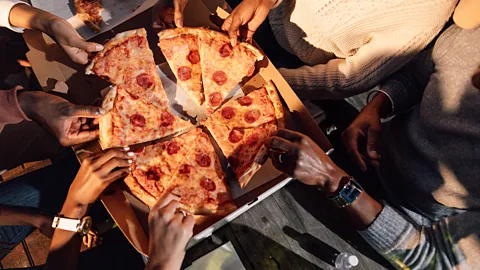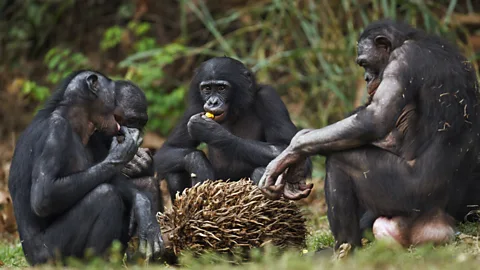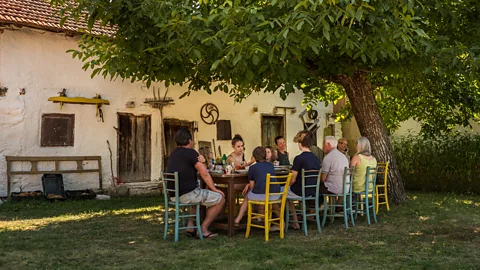Why humans feel the need to feast together
 Getty Images
Getty ImagesFor thousands of years, humans have come together in small groups to feast on food. Why is it important – and why do we still continue the tradition?
It's a peculiarly human universal: we like to sit down together for a good tuck-in. Meals out with friends, dinner parties, holiday get-togethers where we regularly overindulge – eating shared meals is so common that it's rarely remarked upon, except when the idea that it's not happening enough enjoys a societal vogue.
Panics about a decline in family dinners, for instance, regularly sweep through headlines. There is some evidence that such concerns are not a modern trend and may be at least a 100 years old. Eating together, all this suggests, is not only common, but somehow deeply powerful. But why?
Sharing food as a behaviour is likely to go back to before the origin of our species, as chimpanzees and bonobos, two of our closest primate relatives, also share food with their social groups, biologists have observed. But giving food to those closest to you is not the same as having a meal together, points out sociologist Nicklas Neuman of Uppsala University in Sweden. "You can distribute food as an object without sitting down and actually eating with others," he says. Humans seem to have added a number of complex social layers to this act.
The first shared meal may have taken place around a campfire. No one is certain when humans or human ancestors first learned to cook – estimates vary wildly, with the oldest suggested date being 1.8 million years ago – but when someone has gone to the trouble of hunting or gathering food, putting together a fire, and then cooking over it, it implies that they may have a social group to help them with the many stages of this process.
 Getty Images
Getty ImagesAnd once you are all seated around a fire, a warm, bright beacon in the darkness, you may find yourself staying awake later, speculates Robin Dunbar, a biological anthropologist at the University of Oxford in the UK. Those extra hours in the day may have been golden opportunities for social bonding over food.
Whatever the details of its origins, eating meals together is linked to higher wellbeing, Dunbar found in a 2017 study that asked people living in the UK how often they ate meals with others. Eating with others more frequently correlated with greater satisfaction in life and having more friends to rely on for support. Dunbar performed a statistical analysis that suggested that the meals caused the social effects, rather than being their result.
"Eating triggers the brain's endorphin system, the main pharmacological underpinning bonded relationships in primates and humans," Dunbar says. "Eating together as a group ramps up the endorphin effect in the same way that jogging together does. This is because synchronised activity increases endorphin output by a factor of two."
Eating the same thing at the same time as someone else makes them seem more trustworthy, journalists Cynthia Graeber and Nicola Twiley learned when they investigated this subject on their podcast Gastropod. Ayelet Fishbach of the University of Chicago Booth School of Business, whom they interviewed, found that in an investment simulation, people gave more money to someone they'd eaten the same candy with previously.
As well, people who had eaten the same snacks were also quicker to reach a satisfactory end to a negotiation than people who hadn't. Fishbach suggests that this is a kind of relic of an earlier time, when perhaps having similar tastes in food might have been a clearer signifier of shared values than it is today.
But eating together isn't a simple, consistently positive act. Feasts, meals at which an outsized amount of food is shared, can be highly choreographed ways of showing submission and control. Think of a harvest tradition in which a landowner provides a large meal for their workers, or an office party where an employer's largess, or lack thereof, is scrutinised by the attendees. And regular family meals, as lauded as they are, aren't necessarily free of friction.
 Getty Images
Getty Images"If you ask them, people will say they enjoy having shared meals with friends and loved ones. But it can also be a horrible experience to eat together with loved ones," says Neuman. "It's a place for control and dominance as well." Meals where someone else regularly criticises your decisions or your weight are hardly helping wellbeing.
Indeed, in one of Neuman's ongoing research projects, on attitudes about eating together among the elderly in Sweden, he's uncovered something that may be surprising. "We ask them deliberately if they feel bothered by eating alone. Most of them don't," he says. They like eating with others, but, at least in this particular group of interviewees, they don't feel its loss as acutely as you might expect. Maybe that has to do with whether they already suffer from loneliness, he speculates: if that's the case, then a solitary meal might amplify someone's discomfort.
"But if you are a person who often eats with others, then probably, once in a while," Neuman says, "it would be nice to sit by yourself and read".
--
If you liked this story, sign up for The Essential List newsletter – a handpicked selection of features, videos and can't-miss news, delivered to your inbox twice a week.
For more science, technology, environment and health stories from the BBC, follow us on Facebook, X and Instagram.
